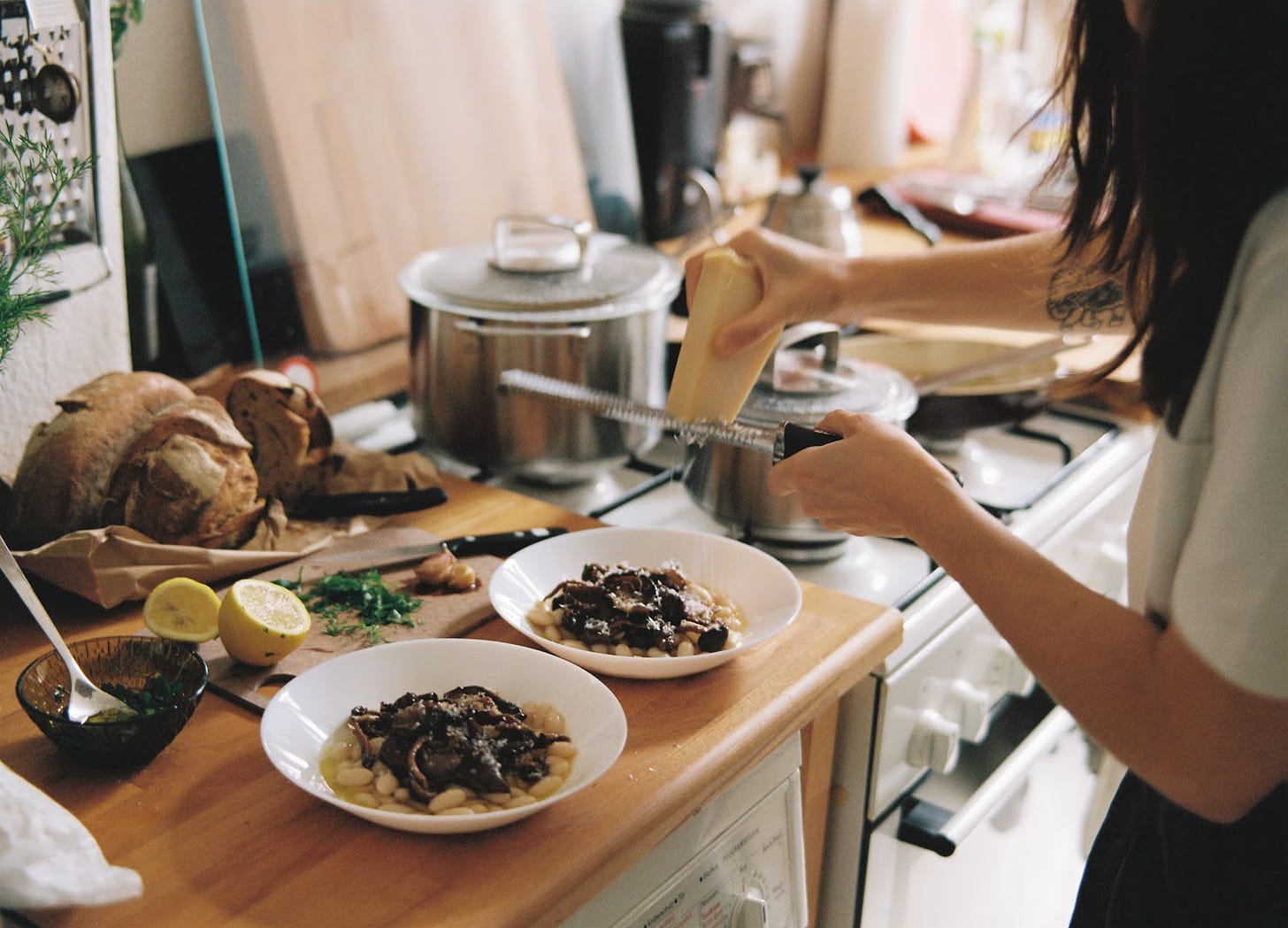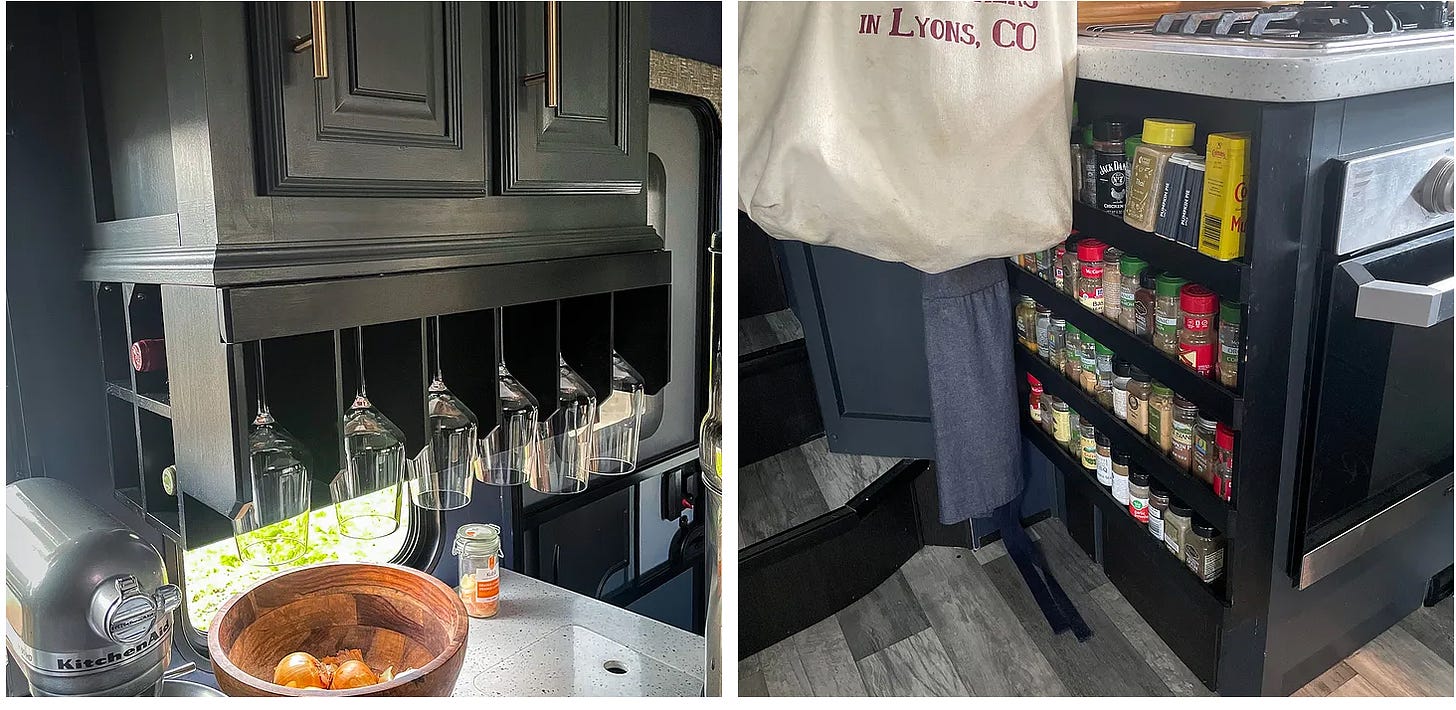Helpful tips from the FoodStack Community on keeping our kitchens neat, tidy, and easy to manage?
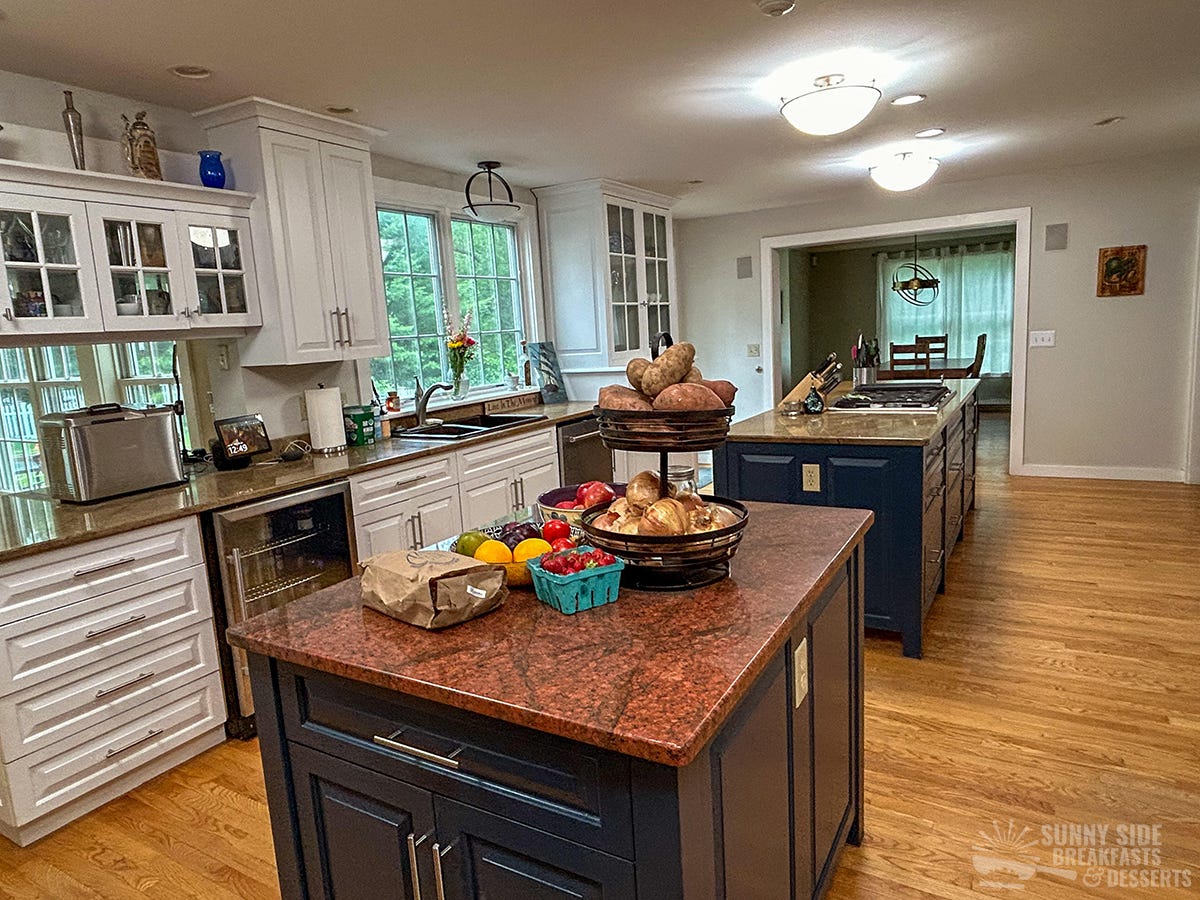
Our Q&A: Other people’s kitchen series gives us many interesting tips on managing things easily in our kitchens. Whenever a food writer invites us into their kitchens, I ask them this question.
‘What tips can you give us that will help keep our kitchens neat and tidy, and easy to manage?’
I’ve collated them on one page and will add more whenever a Q&A post is published.
Q&A with Stephanie Hansen first published on 20th November 2024
This is what
had to say.I am not the most organized person, but I do have a few food tips for photo shoots or TV shoots:
Shopping at the secondhand stores in your neighborhood is my number one tip. I get all my see-through glass bowls and tablescape props from my local Goodwill or resell shops. When styling a cookbook, I look for napkins or colorful table decorations and wooden cutting boards in various shapes and grans of wood. The secondhand stores are unique, and you can resell what you don’t need when your project is over.
Have all the food and tools prepped on a baking sheet ahead of the shoot? (I say this but I am always reaching for a spatula, whisk or spoon).
Q&A with Will Rankin first published on 13th November 2024
This is what
of Plant Based Planet had to say.Given our tiny kitchen, organisation and tidiness are key.
In a small space, and certainly something I picked up while odd jobbing in kitchens as a student, is to clean up and wash dishes as you go.
Storage jars are fantastic, especially if you buy from bulk stores (or an ancient electric milk float that trundles past your house every now and then), as they allow you to keep an eye on your stock of everything, and look neat and tidy.
Storage boxes — we got six small ones from Amazon — help keep odd-shaped things like packets and bottles organised, again, very useful when you’re tight on space and time. I’ve spent way too long in the past hunting for a packet or box of something.
Categorising stuff into small boxes is so much better for the mind! So we’ve got one with sauces in it (Sriracha, soy, chipotle, etc), one with baking ingredients (baking powder, yeast, almond essence, vanilla essence, etc) and one with cooking ingredients like Thai pastes, noodles, seaweed, etc.
I think getting air in a kitchen is a hot tip — be it from a permanently open window, an extractor fan or even an air purifier. Kitchens can become hot and stinky places, so get some air in, and you’ll thank yourself.
While I like cooking under bright light, the rest of the time, the kitchen basks in ambient lighting, creating a warm and welcoming space. We don’t use the main light, but there’s under cupboard strip lighting, fairy lights, and built—in lights in the extractor fan.
In terms of cooking, I’d love to be one of those people that spend some hours every week chopping and prepping ingredients for the week — or even bulk cooking, but it’s something I’ve only ever managed half a dozen times. Prep is key to making ten minute evening meals, and so worth it, if you can get into the habit!
Q&A with Julie McCoy first published 6th November 2024.
This is what
of Something Tasty had to say.Clean as you cook. Don’t put the dishes in the sink because you are too tired to put them in the dishwasher. Even when we didn’t have a dishwasher, I always did the dishes, dried them, and put them away because I didn’t want to deal with a mess in the morning.
This clean as you go approach probably stems from having to deal with bugs (roaches) in our first apartment in Brooklyn. If there was anything I could do even back then to keep the bugs from coming into our apartment I would try it. Unfortunately, the only way we could get rid of the bugs was to eventually move.
I also make sure to throw out spices I don’t use. And since I’ve started canning, I now check the expiration dates on everything.
Q&A with Devan Grimsrud first published 30th October 2024
This is what
of Darn Good had to say.Ooh, haha, as you just heard, I’m not the best when it comes to organization in the pantry, but one thing I always try to do, especially with fresh food, is FIFO or First In, First Out.
It’s an easy, clear way to prioritize the cooking and using of food that’s been in the fridge or pantry longer; what went in first, should also be used first. It’s really helpful to cut down on food waste, and while I’m personally not really able to organize my pantry this way, I’m pretty strict about this when it comes to the fridge and freezer. I think it’s a great method that more people should know.
Q&A with Nicki Sizemore first published 23rd October 2024
This is what
of Mind, Body, Spirit, FOOD had to say.One of my favorite things about my kitchen is my “appliance garage.” It’s basically a cubby on the counter that holds my Vitamix, food processor, and stand mixer, the three appliances that I use most. Each appliance is plugged in, and I just need to open the door and slide it out. When I’m done, I can slide the appliances back into the “garage” and shut the door, giving the counter a clean, uncluttered feel (you can see it in the video).
Q&A with Emma Frisch first published 16th October 2024
This is what
of Time for Dins had to say.I always suggest people organize their pantry and fridge/freezer first (here’s a quick tutorial on dialing in your pantry). We often have products that are expired or simply never used, from a recipe that required an exotic ingredient we never used again. We actually need far less ingredients than we think we do to make a delicious, nourishing meal.
I encourage people to have on-hand the ingredients they know and love, and feel comfortable cooking with. There’s no need to have 50 spices and herbs - they won’t maintain their flavor in a bottle tucked away in a cupboard. In Italian cooking, I use a handful of spices and herbs, primarily thyme, rosemary, oregano, sage, bay leaves, and dried chili peppers.
Another strategy that helps me keep a well-organized fridge is to subscribe to a farm share, or CSA (community supported agriculture), which I explain in this post. After working through a week's worth of produce, I end up with a fairly empty fridge, and start over when I pick up my new weekly share. This also ensures I'm always cooking with fresh ingredients!
Q&A with Perzen Patel first published 9th October 2024
This is what
of had to say.
I have three spice related tips.
Firstly, if you cook with more than 3-4 spices, you need a Masala Dabba in your kitchen. An unassuming steel box containing seven steel bowls, a masala dabba is to the indian kitchen what an oven is to the western kitchen: a necessity. I wrote about this in my post Garam Masala - The Key to Flavourful Indian Cooking’
Next, if you’re grinding your own spice blends or using whole spices in your cooking, you must dry roast them first, ideally individually. Dry roasting spices allows them to bloom and release their full flavour. This seemingly unnecessary step is what makes your curries go from meh to mwah (chef’s kiss).
And finally, I used to roll my eyes behind my mother-in-law’s back for buying spice packets in 50gm sizes but I’ve learned that spices, especially spice blends, lose their aroma rapidly. Buying them in smaller quantities means you ended up using the spices when they taste best.
Q&A with Kate Hill first published 2nd October 2024
This is what
of The Camont Journals had to say.I use the same tools over and over, so I would start by eliminating the things you really don’t use. I have too many knives, and it’s a project for this fall to cull them.
Q&A with Jessie - Sierra First published 25th September 2024
This is what
of The Last Bite had to say.Oh boy! I have loads of advice for the home cook and budding home entertainer!
Emphasize quality over quantity; Whether I’m buying a specialty ingredient or a new kitchen tool, I like to keep in mind the quality of the item for the value. If I’m hosting a dinner party, I’ll splurge on a high-quality cut of beef for my guests, but look for more cost-effective starches and vegetables to round out the meal. The same mentality goes for high end spirits too. It’s better to have a little of something amazing, than a lot of inferior tasting product for less cost.
Streamline your menus; I like to create dining experiences for my family and friends, without being tied to the hot stove all night! The point of entertaining is not only to host your guests, but to also enjoy their company! When I menu plan, I will often pick out one or two “star recipes”; recipes that require a bit more work, but will carry the dinner. Usually these are main dish recipes and desserts. I try to make the rest of the menu delicious, but easy. A fresh harvest salad or garlic and feta roasted potatoes, are simple to make and don’t need any babysitting while the “star” whole roasted chicken cooks in the oven.
Similarly, look to cooking techniques that can also streamline the cooking process. A sous vide machine (cooking via heated water bath) is fantastic for cooking large cuts of meats. Simply season and vacuum seal your protein in a plastic bag and then set the sous vide machine to your desired temperature. It’s a “one and done” type of cooking technique and once your protein is at temperature, it maintains it without overcooking.
That means it’s ready and waiting for you when it’s time to serve, instead of the other way around – a planner’s dream!
Cocktails can create magic. As cooks, we put a lot of time and energy into the menu and meal prep. Knowing how to whip up one or two bespoke cocktail recipes is a game changer! It doesn’t have to be super complicated, either. A fresh grapefruit Aperol spritz is a refreshing summertime drink that takes two minutes to make. Just pour pink grapefruit juice, Aperol, prosecco, a little bit of simple syrup, and a dash of soda water over ice and stir. No shaker required! If you wanted to bring your mixology skills up a notch, try your hand at herb or spice infused simple syrups that you can make yourself. Remember, simple syrup is just a 1:1 ratio of sugar and water boiled together. You can add cinnamon sticks for a holiday syrup, or fresh rosemary to perk up your next gin sour.
Q&A with Rebecca Blackwell. First published 18th September 2024
This is what
of Let’s Get Lost had to say about keeping her 4 x 7 foot RV kitchen neat and tidy.Clean as you go. We don’t have a dishwasher and I don’t miss it. When you’re working in a small space, you simply don’t have the room to allow dirty dishes to pile up. But honestly, no matter what the size of your kitchen or how many pots and pans and utensils you have, cleaning as you go is a more efficient way of cooking.
Q&A with Sophia Real. First Published 11th September 2024
This is what
of Real Simple Foods had to say.My biggest tips for keeping the kitchen tidy are (i) always having a rubbish bowl next to you while you cook or bake (to save you from multiple trips to the bin), (ii) tidying up and washing up as you go along and (iii) washing up anything that is left right after a meal or at least putting any pots and pans that need soaking to soak. Also, the luxury of having a weekly cleaner should not be underestimated!
Another organisation trick I find super helpful is that the moment my husband or I finish one of our staples, we immediately put it on our shared running grocery list.
Otherwise I like to keep a few staples in our pantry and freezer that allow us to assemble quick meals even when we are otherwise low on groceries - that includes things like rice, pasta, passata plus a few tinned foods like tuna, sardines, chickpeas etc., some frozen vegetables and frozen gyoza. It is nice to know that even when our fridge is bare we can have a tasty and nutritious meal on the table in under 30 minutes.
Q&A with Brianna Plaza First published 4th September 2024
This is what
of had to say.I try not to buy too many things I don’t need, hence why I don’t have a lot of kitchen gadgets or extra tools. I also try not to make too many recipes that require buying a ton of new ingredients and instead I prefer to work with what I have. There are exceptions to both rules, sure, but not having too much stuff helps keep my kitchen less cluttered. I have gotten very good at restraining myself when I go to New York’s specialty stores because I simply don’t have the room to store things.
I also try to be a clean as I go person, though admittedly, I sometimes give up at some point during the cooking process and the dishes pile up in the sink. But when I clean as I go, it does make cleaning at the end feel way less annoying.
Q&A: with Christi Flaherty First published 28th August 2024
This is what
of had to say.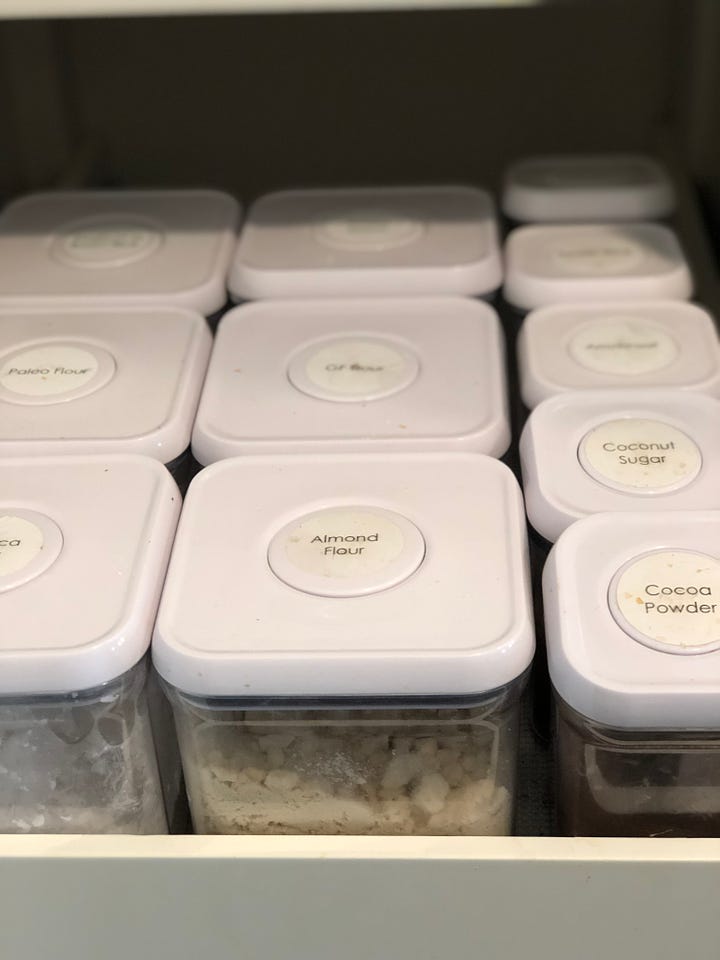
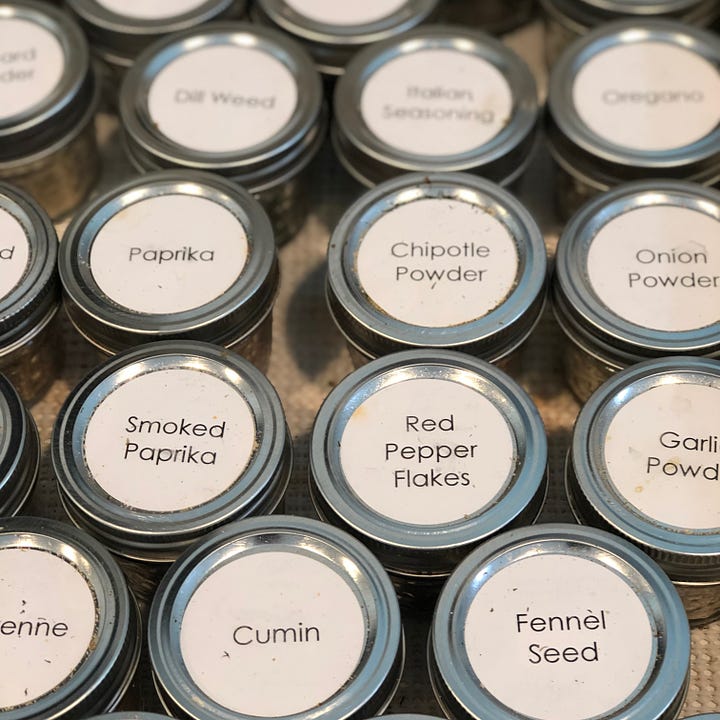
Generally, I’m not a super neat and tidy person. My husband comes behind me and straightens out my spice jars so all the labels face the same direction. I’m just not super detailed which is why I’m a cook, not a baker. As I said, I have ADD tendencies and having to pay attention to details escapes me many times.
That said, I do at least have all my spices in matching 4 oz mason jars with cute little labels (photo) and I organized at least one shelf of my pantry with labeled containers. I felt pretty accomplished in the world of organization with these two areas being somewhat neat.
Q&A with Martin Sorge. First published 14th August 2024
These useful tips came from
of .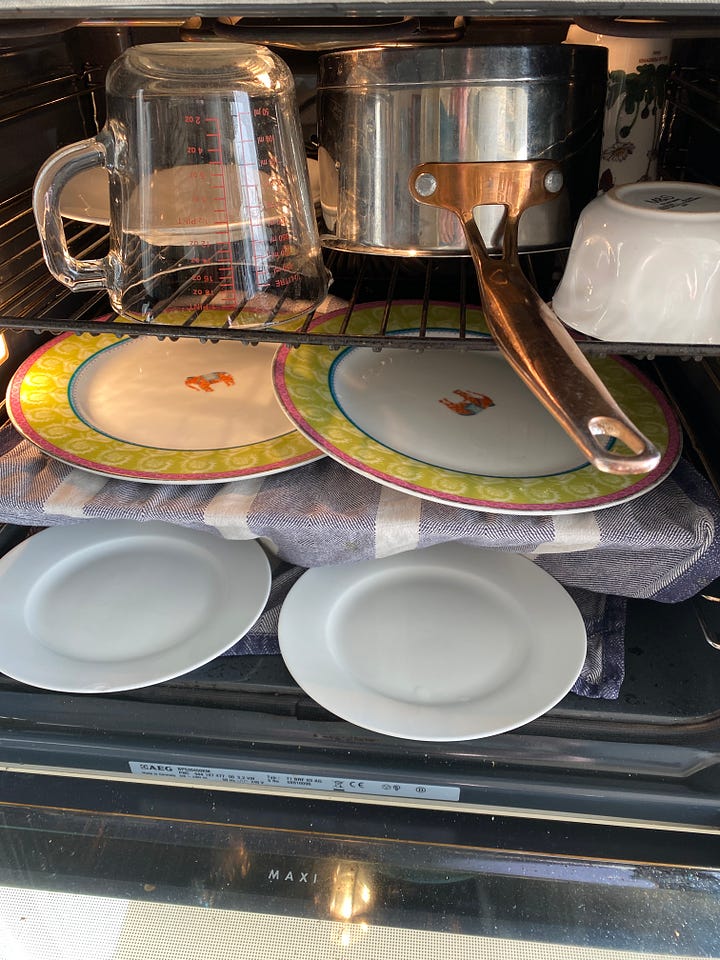
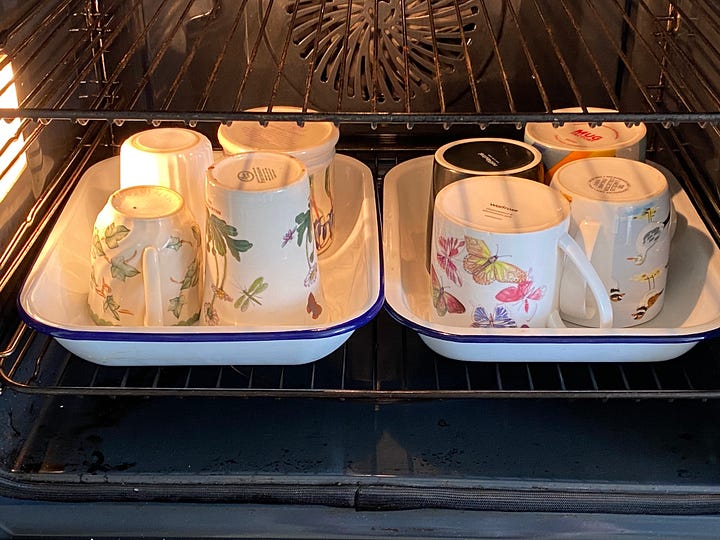
Tidy up before you start. Before you embark on a recipe, clear away the clutter, put things away, empty the dishwasher, and calm your mind. I think about my time on the Baking Show. We always started with a clean bench (a huge thanks to the folks who cleaned up after us), and our ingredients set out for us. A tidy station helps avoid chaos and stress, which, for me, means fewer mistakes.
After baking, you can use the residual heat in the oven to dry some of your dishes. After you wash your dishes, instead of drying them off, put anything oven-proof, especially baking pans, into a turned-off oven that still has a bit of heat left. If the oven is still warm, they’ll dry out quickly.
Lynn says. This is such a useful tip that I have used a few times myself. See the above images. Just remember to remove them before you switch the oven on again.
Don’t buy a new gadget/pan/etc. unless you think you’ll use it at least three times. If I see a recipe that calls for an odd pan or gadget that I don’t have, like a mini-muffin pan, then I won’t make it right away. I’ll wait until I come across (or think of) two other recipes that use that item, and then I'll make the purchase. That way you don’t have a kitchen full of single-use items.
Q&A: with Rachel Ciordas. First published 7th August 2024
of is a gluten free cook, and I asked her, What tips can you give a Gluten Free cook that will help keep their kitchen neat and tidy?
Gluten free bakers and cooks often have many specialty ingredients and flours. Invest in some mason jars or similar canisters to be able to easily see what ingredients you have and access them easily.
Also, in kitchens that are shared gluten and gluten free it is important to have separate storage of the gluten free dedicated equipment that you own, whether it is separate cupboards or bins inside the cupboard it is easy to get confused and nobody wants that!
When I bring my dedicated gluten free cooking utensils (rolling pins, nonstick pans etc) to other kitchens for cooking classes I mark them with a certain color of painters tape, which helps me and others know which items are dedicated gluten free easily and really helps prevent mixing things up!
Q&A: with George and Linda. First published 31st July 2024
These are the tips
of George’s Kitchen gave us.It’s quite simple. Do your prep well in advance of when you start to cook.
And when you do something - clean up immediately once done and put all your ingredients away.
Salad dressings are a good example. We always make our own.
I get all the ingredients and utensils, make the dressing and then put the ingredients away with the utensils going into the dishwasher. If you don’t do that, you have a super messy kitchen and cleaning up becomes a Herculean and distasteful task.
Q&A with Suzy First published 24th July 2024
of shared this with us about using her mudroom.
What helps me is the space in the mudroom for all the produce, potatoes, and onions. All the fruits and veg used to cause a lot of clutter in any kitchen I had before this one.
The mudroom I have is not large, but it gives me that extra space for storing things. I suppose a pantry type of area or some shelving if one can't fit a mudroom would get the job done nicely as well!
Q&A with Christina Fiore, first published 10th July 2024
of gave us these tips when I asked if she had any baking tips to share with us. Use an oven thermometer: Always use an oven thermometer because the temperature you set on your oven might not match the actual temperature that is reached. I keep an oven-safe thermometer in both of my ovens to check the temperature before baking.
Read the entire recipe: Read the entire recipe - including all the ingredients and instructions - before you start. Sometimes, the accompanying post also has helpful tips that aren't in the printable recipe. For my recipes, I always add extra tips in the post to help you succeed.
Organize your ingredients: After reading the recipe, prepare and measure all your ingredients. This makes it easier to follow the recipe and reduces stress while cooking or baking.




